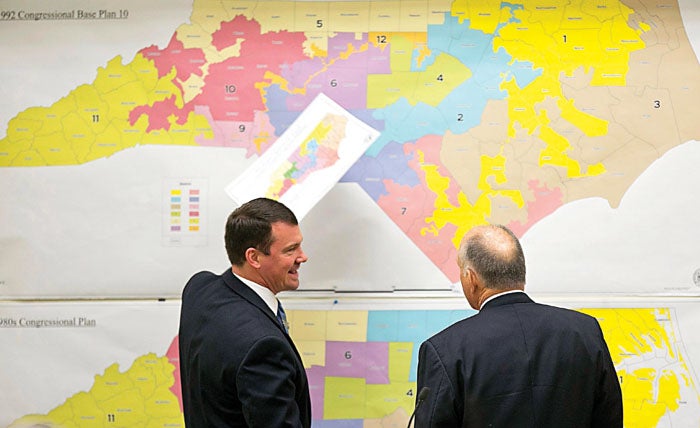Other Voices: Another attack on gerrymandering
Published 12:54 am Thursday, November 15, 2018

- FILE - In this Feb. 16, 2016, file photo, Republican state Sens. Dan Soucek, left, and Brent Jackson, right, review historical maps during The Senate Redistricting Committee for the 2016 Extra Session in the Legislative Office Building at the N.C. General Assembly, in Raleigh, N.C. Federal judges ruled Jan. 9 and again Aug. 27 that North Carolina's congressional district map drawn by legislative Republicans is illegally gerrymandered because of excessive partisanship that gave GOP a rock-solid advantage for most seats and must quickly be redone. (Corey Lowenstein/The News & Observer via AP, File)
Well of course it’s blatant and outrageous gerrymandering, with state and federal legislative districts deliberately drawn to give one party overwhelming advantage over the other. Nobody has offered an honest argument to the contrary.
Rather, the Dark Lord of Gerrymander — more widely known as Republican Rep. David Lewis of Harnett County, the chief legislative architect of those districts — freely admits to the mischief, saying he set out to draw as many districts as possible that give advantage to his party, and that he’d have drawn more of them if it was technically possible. Political analysts across the country routinely name North Carolina as the state that somehow gets away with the most extreme gerrymandering in the nation.
And the courts have agreed. North Carolina’s politically extreme redistricting was so blatantly unfair that it convinced many federal judges, for the first time in our nation’s history, that political gerrymandering should be banned, or at least substantially tamed. Only the U.S. Supreme Court has yet to make it official. It thought about buying into the trend in its last session, but then chickened out, sending a North Carolina challenge and several others back to lower courts on technicalities.
Sadly, we were also found to be a national leader in racial gerrymandering, and on that count, the Supreme Court had no hesitancy in ruling against us.
And now comes a renewed front in the war on gerrymandering, led by the political reform group Common Cause and the state Democratic Party. They and some Democratic and unaffiliated voters filed suit Tuesday against the Republican mapmakers in a Wake County court, where it will be heard by a three-judge panel. The suit argues that, “Elections to the North Carolina General Assembly are not ‘free’ when the outcomes are predetermined by partisan actors sitting behind a computer.” Any verdict is expected to be appealed to the state Supreme Court.
The latest push against gerrymandering comes as we move closer to the 2020 federal census and the national presidential election in the same year. The outcome of the census will lead to yet another redrawing of state and congressional legislative districts and the suit’s proponents are hoping to end political gerrymandering by then. “Because lawmakers stubbornly refuse to consider passing redistricting reform, we’re left with no choice but to litigate,” Common Cause NC Executive Director Bob Phillips said in an announcement of the suit. “Gerrymandering is detrimental to democracy, denying voters a choice and a voice on Election Day.”
State GOP Executive Director Dallas Woodhouse couldn’t resist the small irony and tweaked the Democrats: “Only North Carolina Democrats would file a lawsuit to overturn districts that they just won.” Democrats did make a good showing on Election Day, taking enough additional seats in the state House and Senate to end the Republicans’ veto-proof majority and force the two parties to negotiate on major legislation and overrides of Gov. Roy Cooper’s vetoes. But the truth is that the party would have done even better if it was campaigning in districts that were politics-neutral, drawn to give fair and equitable representation to all voters.
This latest set of legislative maps was drawn in 2017. Republican-drawn maps have been under almost constant legal challenge since they were drawn early in this decade. The suits charging racial gerrymandering were upheld and resulted in the redrawing of numerous districts. The party that wins the 2020 legislative races will get to draw the next set of maps. Filing for those elections begins in just over a year.
What we and many others interested in fair elections want to see is an end to partisan gerrymandering before that election, and before the 2020 census. We don’t want Democrats drawing our electoral districts any more than we want Republicans to do it. An independent commission should be doing that work, free from political influence from any direction. We hope this new suit is one more step toward that goal.
— The Fayetteville Observer

